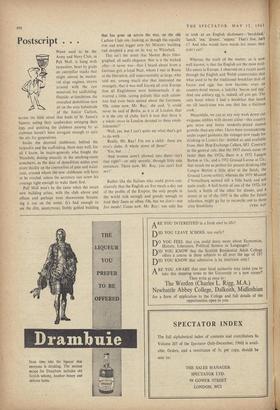Postscript . .
Inside the doomed clubhouse, behind the tarpaulin and the scaffolding, there may well, for all 1 know, be major-generals who fought the Matabele, dozing uneasily in the smoking-room armchairs, as the dust of demolition settles ever more. thickly on the convexities of pate and waist- coat, around whom the new clubhouse will have to be erected, unless the secretary can screw his courage tight enough to wake them first.
Pall Mall won't be the same when the smart new building arises, with the club above and offices and perhaps even showrooms brazen- ing it out on the street. It's bad enough to see the dim, anonymous, feebly gabled building
that has gone up across the way, on the old Carlton Club site, looking as though the equally dim and even bigger new Air Ministry building had dropped a pup on its way to Whitehall.
This isn't the street that Shotter Boys litho- graphed, all sunlit elegance Nor is it the wicked alley--it never was—that I heard about from a German girl, a loyal Nazi, whom I met in Rome at the liberation, still unaccountably at large, who told me, among much else that interested me strangely, that it was well known all over Europe that all Englishmen were homosexuals. 1 de- murred a little, saying politely that such calum- nies had even been spread about the Germans. 'Oh, come now, Mr. Ray,' she said, 'it could never be said of Berlin, as it is of London, that it is the city of clubs. Isn't it true that there is a whole street in London devoted to these estab- lishments?'
'Well, yes, but 1 can't quite see what that's got to do with .
'Really, Mr. Ray! I'm not a child: these are men's clubs. A whole street of them!'
'Yes, but . .
'And women aren't allowed into them—isn't that right?—or only secretly, through little side entrances. There now, Mr Ray, you can't fool
me!' *
Rather like the Italians who could prove con- clusively that the English ate five meals a day out of the profits of the Empire, the only people in the world rich enough and greedy enough to feed their faces so often. Oh, but we don't—not five meals! Come now, Mr. Ray : one only has
to look at an English dictionary—'breakfast; 'lunch,' 'tea,' dinner; 'supper.' That's five, isn't it? And who would have words for meals they didn't eat?
Whereas the truth of the matter, as is now well known, is that the English are the most bird- like eaters in Europe. I observed on a recent jaunt through the English and Welsh countrysides that what used to be the traditional breakfast dish of bacon and eggs has now become, even on country-hotel menus, a ladylike 'bacon and egg.' And one solitary egg is, indeed, all you get. The only hotel where I had a breakfast that lasted me till lunch-time was one that has a German cook.
Meanwhile, we can at any rate wash down our exiguous nibbles with decent cla'ret—this country gets more and better modestly-priced named growths than any other. I have been reconsidering. under expert guidance, the vintages now ready for drinking in Lyons's list—bottled at, and available from, their Hop Exchange Cellars, SE1. Contrary to the general rule, that the 1953 clarets came on faster than the 1952s, there is a 1952 Langoa Barton at 13s., and a 1952 Gruaud Larose at 12s., that struck me as perfect for present drinking (the Langoa Barton a little drier at the finish; the Gruaud Larose softer), whereas the 1953 Mouton d'Armailhacq seemed still a little hard, and not quite ready. A half-bottle of one of the 1952s for lunch, a bottle of the other for dinner, and g dozen or so of the 1953 in the cellar for future reference, might go far to reconcile one' to those






































 Previous page
Previous page